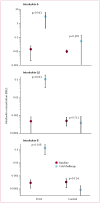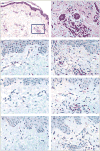Prevention of cold-associated acute inflammation in familial cold autoinflammatory syndrome by interleukin-1 receptor antagonist
- PMID: 15541451
- PMCID: PMC4321997
- DOI: 10.1016/S0140-6736(04)17401-1
Prevention of cold-associated acute inflammation in familial cold autoinflammatory syndrome by interleukin-1 receptor antagonist
Abstract
Background: Familial cold autoinflammatory syndrome (FCAS) is an autosomal dominant disorder characterised by recurrent episodes of rash, arthralgia, and fever after cold exposure. The genetic basis of this disease has been elucidated. Cryopyrin, the protein that is altered in FCAS, is one of the adaptor proteins that activate caspase 1, resulting in release of interleukin 1.
Methods: An experimental cold challenge protocol was developed to study the acute inflammatory mechanisms occurring after a general cold exposure in FCAS patients and to investigate the effects of pretreatment with an antagonist of interleukin 1 receptor (IL-1Ra). ELISA, real-time PCR, and immunohistochemistry were used to measure cytokine responses.
Findings: After cold challenge, untreated patients with FCAS developed rash, fever, and arthralgias within 1-4 h. Significant increases in serum concentrations of interleukin 6 and white-blood-cell counts were seen 4-8 h after cold challenge. Serum concentrations of interleukin 1 and cytokine mRNA in peripheral-blood leucocytes were not raised, but amounts of interleukin 1 protein and mRNA were high in affected skin. IL-1Ra administered before cold challenge blocked symptoms and increases in white-blood-cell counts and serum interleukin 6.
Interpretation: The ability of IL-1Ra to prevent the clinical features and haematological and biochemical changes in patients with FCAS indicates a central role for interleukin 1beta in this disorder. Involvement of cryopyrin in activation of caspase 1 and NF-kappaB signalling suggests that it might have a role in many chronic inflammatory diseases.
Relevance to practice: These findings support a new therapy for a disorder with no previously known acceptable treatment. They also offer insights into the role of interleukin 1beta in more common inflammatory diseases.
Conflict of interest statement
We declare that we have no conflict of interest.
Figures







References
-
- International FMF Consortium. Ancient missense mutations in a new member of the RoRet gene family are likely to cause familial Mediterranean fever. Cell. 1997;90:797–807. - PubMed
-
- French FMF Consortium. A candidate gene for familial Mediterranean fever. Nat Genet. 1997;17:25–31. - PubMed
-
- Richards N, Schaner P, Diaz A, et al. Interaction between pyrin and the apoptotic speck protein (ASC) modulates ASC-induced apoptosis. J Biol Chem. 2001;9:9. - PubMed
-
- Dowds TA, Masumoto J, Chen FF, Ogura Y, Inohara N, Nunez G. Regulation of cryopyrin/Pypaf1 signaling by pyrin, the familial Mediterranean fever gene product. Biochem Biophys Res Commun. 2003;302:575–80. - PubMed
Publication types
MeSH terms
Substances
Grants and funding
LinkOut - more resources
Full Text Sources
Other Literature Sources
Medical

